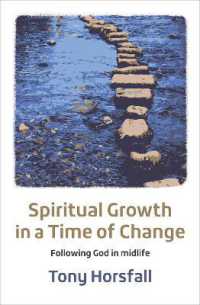- ホーム
- > 洋書
- > 英文書
- > Politics / International Relations
Full Description
Weaving together poetry, personal narrative, and never-before-seen documents from the Jefferson Lewis Edmonds' family archive, Arianne Edmonds provides a wide-ranging look at how the Black Press of the late nineteenth and early twentieth centuries defined Black citizenship after Reconstruction, fostered networks of resistance, and set in motion critical social justice narratives that are still relevant today.
At the turn of the twentieth century, the Black press provided a blueprint to help Black Americans transition from slavery and find opportunities to advance and define African American citizenship. Among the vanguard of the Black press was Jefferson Lewis Edmonds, founder and editor of The Liberator newspaper. His Los Angeles-based newspaper championed for women's rights, land and business ownership, education, and civic engagement, while condemning lynchings and other violent acts against African Americans. It encouraged readers to move westward and build new communities, and it printed stories about weddings and graduations as a testament to the lives and moments not chronicled in the White-owned press.
Edmonds took this fierce perspective in his journalist career for he himself was born into slavery and dedicated his life to creating pathways of liberation for those who came after him. Across the pages of his newspaper, Edmonds painted a different perspective on Black life in America and championed for his community--from highlighting the important work of his contemporaries, including Booker T. Washington and W.E.B. Du Bois, to helping local readers find love in the personal ads section. The Liberator, along with a chorus of Black newspapers at the turn of the century, educated an entire generation on how to guard their rights and take claim of their new American citizenship.
Written by Jefferson Lewis Edmonds' great-great granddaughter, We Now Belong to Ourselves chronicles how Edmonds and other pioneering Black publishers documented the shifting tides in the advancement of Black liberation. Arianne Edmonds argues that the Black press was central in transforming Black Americans' communication patterns, constructing national resistance networks, and defining Black citizenship after Reconstruction--a vision, mission, and spirit that persists today through Black online social movements. Weaving together poetry, personal narrative, newspaper clips, and documents from the Edmonds family archive, We Now Belong to Ourselves illustrates how Edmonds used his platform to center Black joy, Black triumph, and radical Black acceptance.
Contents
A Love Note to Readers
Prologue: Seeds from the Ancestors
Part I. What We Brought with Us: The Stories That We Carry
Jefferson
1. Finding Jefferson
Man Emancipated
2. Forging a Pathway for Liberation
Part II. What Brought Us Together: A Migration Story
Daddy
3. No Longer Will Others Speak for Us
4. Jefferson in Los Angeles
The Man Behind the Press
5. Building, Reflecting, and Future-Casting
6. The Harvest: The Psychological Shift of the Black Community
Part III. Preparing for Our Legacy: All That Blooms
Adina
7. What I Learned
8. Jefferson's Legacy
9. The Year 1913
Epilogue: Note to Adina, Our Queen Califa, and All Those Who Dared to Face the Sea
A Retrospective: Black Angelenos Making History Then and Now
Acknowledgments
References
Index







